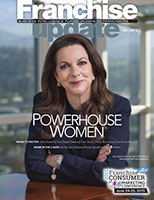UPWARD!: Building and Leveraging your Network to Advance Your Career

"Increasingly, leadership today is defined not just by how many hours you spend at your computer, but your ability to connect to others, says Carol Bartz, former Yahoo CEO and Lisa Lambert, founder of UPWARD."
That's the start of "Why women should do less and network more," an article the two wrote for Fortune last November. It's also the premise behind UPWARD (Uniting Professional Women Accelerating Relationships & Development), the global networking organization for senior professional women that Lambert founded in 2013.
"It's something I had been thinking about for some time. I've seen the disparity in opportunities for men and women in high-tech and in venture capital," says Lambert, who has worked at Intel Corp. for nearly 18 years. "In venture capital, 4 percent of the general partners are women, just 4 percent, which is amazing to me. And in tech, the numbers aren't much better."
Across all industries, sadly, the numbers say it all. If you look at the professional workplace in America, women are 51.5 percent of the professional workforce, says Lambert. "But when you get to the executive positions, the number drops to 13 percent, and when you get to the CEO's office, it drops to 4 percent."
While technology and venture capital are not exactly bastions of progress for women, those numbers illustrate the problem that Lambert, along with many women in business face: the conscious and unconscious bias about women in executive and leadership positions, no matter the industry.
"If I'm experiencing it," says Lambert, vice president of Intel Capital, Intel's venture capital arm, "then how many other women are experiencing it? I'm a fairly senior woman at Intel, yet this happens to me on a regular basis. So I asked myself, what can I do to help effect change?"
Her answer? UPWARD, founded on the premise that women need access to the same types of informal networks and mentorship that men often leverage to succeed in business. UPWARD's first event was in May 2013. Today the organization has more than 1,600 members, obtained through word of mouth. Lambert says the nonprofit organization chose to focus on senior professional women because there is ample support for younger women beginning their careers.
"If there is a glass ceiling and you can't advance further than middle management, then you're really stuck if you haven't built a professional network. That was the problem I sought to overcome with UPWARD: creating a global community of professional women where we're 1) learning from each other; 2) educating ourselves; and 3) proactively helping one another advance," says Lambert. "If you're stuck, there's no reason to stay stuck. There's a way you can overcome that, and that is in relationship with other senior professionals who have your interests in mind."
Heads up!
"A lot of us
"When your head is down, you're on a mission," says Shane Evans, president of Massage Heights, who co-founded the franchise in 2004 with her husband Wayne. "It's absolutely necessary at times, there's no doubt about it, especially if you've just started the company. You're in growth mode, you're just pushing forward, and there are things you have to do to gain that growth." Today the brand has 120 units, with 40 more on the way this year.
"I had my head down for 10 years, doing everything I needed to do and more, working a lot a lot of hours, not really having any kind of balance in my life. My kids forced that balance to some degree, but outside of that, there was none," she says. "If you can find a way to balance that kind of go-hard mentality--I've got to do this, we've got to move fast, get these things done, that passion and diligence for growth--with self-growth, it's a great combination that can make a big difference in both your personal and professional lives."
In mid-2013, with the help of a business coach, Evans decided to lift her head up. "My mission for the past 18 months has been to make meaningful connections, both professional and personal," she says. "It has been my mission since I was able to identify the one thing I could do that no one else could do. And that one thing was deliver the message of Massage Heights: who we are as a brand, what we stand for, what our values are, and pretty much be the face of the brand."
It wasn't an easy transition. "Initially I thought, 'How is that going to help? What is that going to do? There are all these things that have to be done. We're a growing brand, there are franchisees who need support, team members who need to be hired and trained, and all these different things," she says.
"What I have found is that it is so completely beneficial, from a health perspective, and obviously from a learning perspective. You learn so much more from being around other people, and in the franchise world we all have the same challenges," she says.
"Sometimes you think you're the only one, so it's nice to be around other franchisors, especially other women, and recognize that you're not alone, that we're all doing this together, and learn from them. I think our company might have grown faster had I realized the significance in it. I wish I'd figured that out a long time ago."
Learning to network
Debbie Shwetz co-founded Nothing Bundt Cakes in 1997 with her longtime friend Dena Tripp. In 2014, they celebrated the opening of their 100th location. Shwetz, now in her first year as chair of the IFA's Women's Franchise Committee (WFC), is a strong proponent of the value of networking. But she wasn't always as comfortable with networking as she is today--especially as a franchising newbie attending her first IFA conference.
"I remember going to some of my early meetings and thinking, 'Okay, you got yourself here, you got past that hurdle. Now, what are you going to do with it?' There's no one that is going to come running over to you saying, 'I'm so excited to network with you.' You have to put yourself out there and make it happen. And once you do it, just get past that first moment, then generally you find a connection."
During a roundtable at one of those events, she met Mary Ann O'Connell, founder and president of FranWise. "We became friends. I would call her with questions and we'd see each other at different franchising events in California. She invited me to join the WFC," says Shwetz.
"That whole process of meeting her, having her introduce me to this networking group, and being a part of that group for six years has been a huge commitment from me, but it has been so rewarding. I love the women I have met. We network and share business with each other, and have great referrals. It's just been a great experience. I've learned so much--not only about networking and how valuable that is, but also about running conferences, being a leader, and all kinds of different information I wouldn't have expected from that initial foray into that committee. It's really helped me grow as a leader and as a person."
And don't be shy. "Even when you feel uncomfortable or un-knowledgeable, or lack confidence, you have to put yourself out there. You have to be thirsty and hungry for the information you need to get to be successful. I was a sponge with legs and put myself into every possible position that I could where I could hear from people like Catherine Monson
Says Evans, "If you're going to do the networking, attend these events, and invest time and money, it is really important to get the most out of them, and the only way is really joining in and asking questions, whether it's in a small group or one-on-one. And going to others you respect, who you see are doing a great job, who have great values, or their companies are succeeding, and asking questions and finding out how they did it. What do you do every day? What was the difference? When did you see the difference? What happened?"
"Network more, do less"
"It's very easy to get discouraged by the obstacles, because you get frustrated. We say 'Look at my results: I'm loyal, reliable, efficient, productive, I continue to add value to my group. Why am I not getting recognized?' The assumption is that in a meritocracy you're going get exposure and be recognized for your contributions," says Lambert. "Today it's much more about relationships, it's much more about who knows you, who likes you, and who's willing to sponsor you and mentor you."
That's where the power of networking comes in. "It's a much broader skill set than we historically have been told we needed to be successful in our careers. The game has changed, and so our behavior has to change to adapt and to advance in the new world. There are some women who have done that very effectively and advanced to the C-suite, but it's still a very small number," says Lambert.
"There clearly is a different game being played when you get to the senior level," she says. "Getting a college education and getting a job is something women know how to do very well. Getting to those senior roles does not have the same rules. Otherwise, you would see the same penetration at the senior levels."
The takeaway here is that the skill set that took women to middle management positions is not the same skill set needed to advance to the C-suite and other senior positions. To advance to the most senior levels, women need to add these non-traditional skills to their repertoire.
Payback time: mentoring
Evans, a member of the Young Presidents' Organization and the Entrepreneurs' Organization, says she has a number of mentors, mainly outside of franchising right now. "I would love to have a mentor right now within franchising. I know who that person is, and I'm planning to reach out." She's also enjoying life with her head up.
"I got to speak at the emerging franchisor conference in Philadelphia this year, and I'll be a speaker panelist at IFA this year," she says. "I love to share as much as learn from those who have been there before me."
Shwetz, who is farther along on the path from mentee to mentor, feels similarly. "All through the years there have been many people who had an impact, but Mary Ann had a great impact on me. So I've taken what I learned and tried to pay it forward. I also learned how to do that better in my own business, with the people I ask to manage my bakeries. They also need mentoring beyond an employer-employee relationship. And it's a lot of fun. It's so rewarding," she says.
"If other franchisors and people like Mary Ann had not helped me, I would not be where I am today. Our franchise system would never have been the good, solid, honorable system that it is without the things I've learned from the IFA roundtables and the other committee members I've worked with," she says.
"And, on the other side, I have had the opportunity to mentor emerging franchisors and people who have questions. When you make yourself visible and you are willing to share and become part of that sharing community, you become visible and you become a resource. Then people refer to you as someone you can approach and talk to. And I like that. I like helping other people."
Networking 101
There is a long list of things women can do to get exposure, says Lambert. "But before you get into the how-to, you have to believe that your worth is not defined solely by your immediate contribution in your day job. You have to have that bigger picture view that it's not just about your work performance," she says.
"We all know people who can teach us something useful in our careers. Have coffee with them. Don't work over lunch, go out to lunch with someone you can help or who can help you. Join special interest groups, join women's organizations like UPWARD. Be more visible in your workplace. Don't just come in, do your 8-to-5 at your desk and go home. Ask for assignments where you're going to get exposure and get challenged. Schedule one-on-ones with people in authority who can get you the exposure that you want, or who can give you advice on how to go about it ."
Also, she says, "Make sure you have a mentor and a sponsor, somebody more senior than you, who will help you advance your career."
And, very important, make networking a priority, a part of your job if you plan on rising in the professional ranks. "You have to take that job as seriously as you take your day job," says Lambert. "If you don't do that, you won't be able to leverage your relationships it in a way that helps you down the road when you need it."
Catalyst for Change
Catalyst, founded in 1962, is a nonprofit with more than 800 member organizations worldwide, focused on expanding opportunities for women in business. Catalyst researches and publishes information and advice about and for women at work, and is dedicated to creating more inclusive workplaces where employees representing every dimension of diversity can thrive. Here are just some of the many items the group has compiled. Much more is available on their website, catalyst.org.
- Women are just 5% of Fortune 500 CEOs. Translation: men are 95% of all Fortune 500 CEOs.
- Women do ask for raises, almost as often as men (47% of women vs. 52% of men negotiated for a higher salary). They just don't always get what they ask for. Men are paid for potential, while women are paid for proven performance.
- "He" gets a head start--women MBAs get paid $4,600 less than men in their very first job!
- Women who felt racially or ethnically different were less likely to be in senior management positions and more likely to receive fewer promotions.
- Women are less likely to get the "hot jobs" needed to get ahead. They're more likely to have a smaller budget, smaller staff, and less visibility on projects.
- It's a myth that women don't want to reach the top: women and men have equal desire for board and CEO positions.
- Women are more likely to downsize their ambitions than men are.
- Women who felt racially/ethnically different are more likely to downsize their ambitions than white women are.
- Looking for a few good women for your board? Look no further--there is not a shortage of qualified women!
- The "Queen Bee" myth is just that: a myth. Women pay it forward more than men, helping other women out.
- Who benefits from development? Those who develop others experience greater career growth and greater compensation.
- When people think leader, they think male. When will we think female leadership styles are good leadership styles?
Catalyst President & CEO Deborah Gillis
"Pointing out the problem is not enough. You have to be part of the solution."
"Real change doesn't happen unless you take action--and risks."
"Say 'No!' to the status quo! Leaders take initiative, act with intention, and design bold programs with measurable results."
Share this Feature
Recommended Reading:
FRANCHISE TOPICS
- Multi-Unit Franchising
- Get Started in Franchising
- Franchise Growth
- Franchise Operations
- Open New Units
- Franchise Leadership
- Franchise Marketing
- Technology
- Franchise Law
- Franchise Awards
- Franchise Rankings
- Franchise Trends
- Franchise Development
- Featured Franchise Stories
FEATURED IN

Franchise Update Magazine: Issue 1, 2015








 The franchise listed above are not related to or endorsed by Franchise Update or Franchise Update Media Group. We are not engaged in, supporting, or endorsing any specific franchise, business opportunity, company or individual. No statement in this site is to be construed as a recommendation. We encourage prospective franchise buyers to perform extensive due diligence when considering a franchise opportunity.
The franchise listed above are not related to or endorsed by Franchise Update or Franchise Update Media Group. We are not engaged in, supporting, or endorsing any specific franchise, business opportunity, company or individual. No statement in this site is to be construed as a recommendation. We encourage prospective franchise buyers to perform extensive due diligence when considering a franchise opportunity.